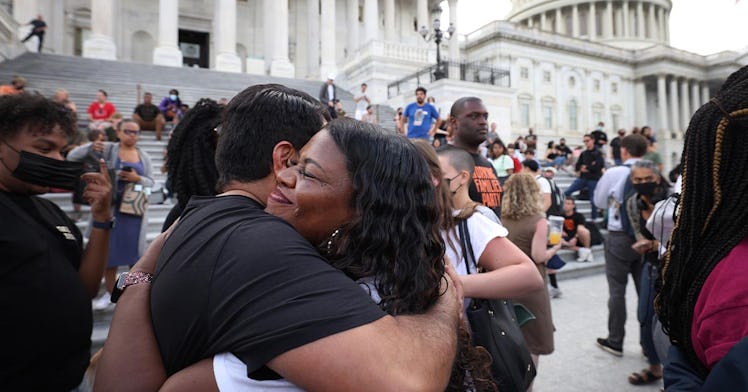Biden’s Targeted Eviction Moratorium is Better Than Nothing
The limited moratorium, extended for two more months, is better than nothing, but far from what Americans at risk of losing their homes deserve.

Representative Cori Bush recently spent three nights sleeping on the steps of the United States Capitol, an eye-catching act of political protest for a sitting congresswoman. The reason? She was protesting the fact that Congress chose inaction and went on a recess after an eviction moratorium that was put in place for the duration of the pandemic lapsed on July 31st. It appears her efforts paid off. Ultimately, her activism attracted the attention of other housing activists, fellow progressive lawmakers, and eventually, and most importantly, President Biden himself to the expiration of the federal eviction moratorium. The Biden admin has, in response, decided to extend the moratorium — but in a limited way. Here’s what to know.
The order lapsed on July 31, but Bush and her allies were able to convince the Centers for Disease Control to issue a new order that temporarily halts eviction proceedings “in counties with heightened levels of community transmission in order to respond to recent, unexpected developments in the trajectory of the COVID-19 pandemic, including the rise of the Delta variant.”
As a practical matter, it applies to 80.87 percent of U.S. counties as of this morning, a testament to just how out of control the pandemic currently is. But that the order is explicitly “intended to target specific areas” and the CDC director’s comment that it’s “tailored” betrays the Biden administration’s fear of appearing too generous to vulnerable people regardless of the epidemiological and moral failure that is allowing any evictions to resume.
It’s not exactly surprising coming from an administration that insisted it didn’t have the power to extend the moratorium as a way of punting the issue to Congress days before the expiration date. But it is supremely depressing.
Most immediately, Biden’s feet-dragging means that families were evicted in the time between the expiration of the previous order and the issuance of the new order. Had the administration simply acted with the courage and urgency the situation demanded, people who have been struggling to pay their rent—often because of unemployment caused by COVID-19—would still be in their homes.
The restriction of the new order to some places and not others is similarly cruel. It premises eviction protection not on personal situations but on the level of spread in a particular county.
This would make sense if the economic devastation, the reason people can’t afford to pay rent and are subject to eviction, was confined neatly to those counties. But it isn’t.
The order, though welcome, leaves patients and caretakers struggling with the medical damage of COVID-19 in counties with lower overall rates of transmission out to dry. What happens when COVID-19 numbers drop, cases recede, and people are still struggling to pay rent?
Eviction ensures a tougher personal recovery for them and increases the likelihood that their communities’ COVID-19 situation deteriorates. And perhaps most frustrating is the fact that the relief wasn’t tailored to the $47 billion in rental assistance that was supposed to go to people who were unable to pay rent and being protected from the eviction moratorium. That money, allocated in the American Rescue Plan, hasn’t made it to the hands of renters — only three percent of it made it to the families who need it. Why not wait until the money gets out to renters before removing them from their homes?
Still, the new order represents a vast improvement over what the Biden administration and Congress were willing to accept before: The complete end of a policy that literally saved lives and meaningfully slowed the spread of COVID-19. Bush and her allies deserve to be celebrated for protecting the majority of the 11.4 million adult renters who are currently behind on rent payments.
“I do know what it’s like to have babies sleeping in a car … my belongings, everything I own in trash bags. Because I know what that’s like, there’s no way that I could sit back and be quiet,” Bush said.
Of course, Bush struggled with housing insecurity years before the pandemic came to the United States. Her being forced to sleep in a car with her children is evidence that evictions, even without a pandemic are an act of violence against the poor.
That people who are struggling to make ends meet in a system that isn’t designed to help them can be forced out of their homes by the state is one of the great failings of public policy. Housing in this country is seen as many things—an investment, a privilege, a lifestyle, a demonstration of wealth—before it’s seen as what it most fundamentally is: something that every person needs and deserves.
So while the new moratorium will keep lots of people in their homes until it expires (assuming there isn’t an extension) on October 3, it’s disappointing that it took a House representative sleeping on public property to force the federal government to address the issue, and in the meantime, have families face eviction. If the pandemic taught us anything, it’s that housing is a public health issue. And in a pandemic that has killed more than 600,000 Americans, the right to housing ought to be protected.